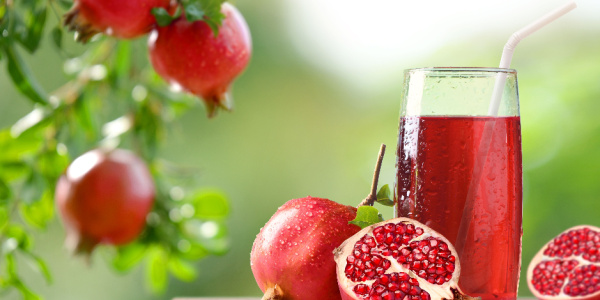Plant-based flavonoids, found in fruits, leaves and vegetables, have attracted much attention for their positive health effects in various diseases. In particular, pomegranate has been recognized as having antioxidant and anti-inflammatory properties that may be of therapeutic benefit in a number of diseases. The fruit of the pomegranate (Punica granatum L.) has been used for centuries in ancient cultures for medicinal purposes. For a long time, the fruit was widely consumed fresh and more recently in the form of juices as a beverage.
Pomegranate Against Alzheimer’s
Forgetfulness, difficulty finding words and confusion about time and place. These are some of the most common symptoms of Alzheimer’s disease. A substance called urolithin A, which is found in pomegranates, strawberries and walnuts, among other things, can improve memory and the treatment of Alzheimer’s disease, according to research by the University of Copenhagen. This was the result of their study on mouse models.
The researchers had previously discovered that a particular molecule, nicotinamide riboside (NAD supplement), plays a key role in neurodegenerative diseases such as Alzheimer’s and Parkinson’s, as it actively helps to remove damaged mitochondria from the brain. Many patients with neurodegenerative diseases suffer from mitochondrial dysfunction, also known as mitophagy. This means that the brain has difficulty clearing weak mitochondria, which accumulate and impair brain function. If the mitophagy process can be stimulated, i.e. weak mitochondria can be removed, the results are very positive, according to the researchers. The results of the new study suggest that the substance contained in pomegranates, urolithin A, is just as effective at removing weak mitochondria in the brain as an NAD supplement. However, further research is needed to decipher the exact mode of action.
Antioxidant-Rich Pomegranate as Cancer Protection
Other research has shown that the consumption of pomegranate extract can slow down the growth of lung cancer in mice. In the study, a team of researchers from the University of Wisconsin examined the effects of oral ingestion of a specific dose of pomegranate fruit extract on growth, progression, blood vessel development and signaling pathways in two lung tumor protocols in mice. The doses tested were comparable to what humans could reasonably consume in a day. Chemicals were used to induce lung tumors and the mice were given pomegranate extract in their drinking water. The lung tumor yield was then examined at different time points over several months. Mice exposed to carcinogenic chemicals and treated with pomegranate had significantly less lung tumor growth than mice treated with carcinogens alone. The tumor reduction was 53.9 percent after 84 days and 61.6 percent after 140 days. The key to pomegranate’s cancer-fighting abilities lies in its richness in antioxidants, which have an anti-inflammatory effect. According to the researchers, pomegranate juice contains even more antioxidants than red wine and green tea, which have also been studied for their potential cancer-preventing effects.
Eating fruits such as pomegranates, which contain anti-aromatase phytochemicals, is also thought to reduce the incidence of hormone-dependent breast cancer. This is according to a study published in Cancer Prevention Research, a journal of the American Association for Cancer Research. The pomegranate is rich in a number of compounds called ellagitannins, which, as shown in this study, appear to be responsible for the pomegranate’s proliferation-inhibiting effect. Phytochemicals suppress estrogen production, which prevents the proliferation of breast cancer cells and the growth of estrogen-responsive tumors. The ellagic acid contained in pomegranates inhibits aromatase, an enzyme that converts androgen into estrogen. Aromatase plays a key role in the development of breast cancer; therefore, the growth of breast cancer is inhibited. Other studies have shown that the fruit suppresses pro-inflammatory cell signaling proteins in colon and prostate cancer.
Pomegranates Alleviate Osteoarthritis
Pomegranate fruit extracts can also block enzymes that contribute to osteoarthritis. This is according to a study from Case Western Reserve University School of Medicine published in the Journal of Nutrition. The study examined the ability of a pomegranate extract to fight interleukin-1b (IL-1b), a pro-inflammatory protein molecule that plays a key role in cartilage breakdown in osteoarthritis. Current treatments for osteoarthritis offer limited efficacy and do little to slow joint destruction and disease progression. The Case study is the first to demonstrate that pomegranate extracts can slow the deterioration of human cartilage. One advantage of the fruit, which originates from Persia, is that its antioxidant ingredients are quickly absorbed by the body and are non-toxic.
Using tissue samples of human cartilage affected by osteoarthritis, the researchers added a water extract of pomegranate fruit to the culture in an established in-vitro model. The results showed a new activity of the pomegranate fruit extract – namely the protection of cartilage – in addition to the antioxidant and anti-inflammatory properties already discovered. The IL-1b protein molecules cause an overproduction of inflammatory molecules, including matrix metalloproteases (MMPs), which are tightly regulated enzymes necessary for tissue remodeling. When overproduced in a disease state, such as osteoarthritis, they degrade cartilage, leading to joint damage and destruction.The results of the case study show that pomegranate fruit extracts inhibit the overproduction of MMP enzymes in human cartilage cells. This suggests that consumption of pomegranate fruit extracts may help protect cartilage from the effects of IL-1b by suppressing cartilage degradation in osteoarthritis.







